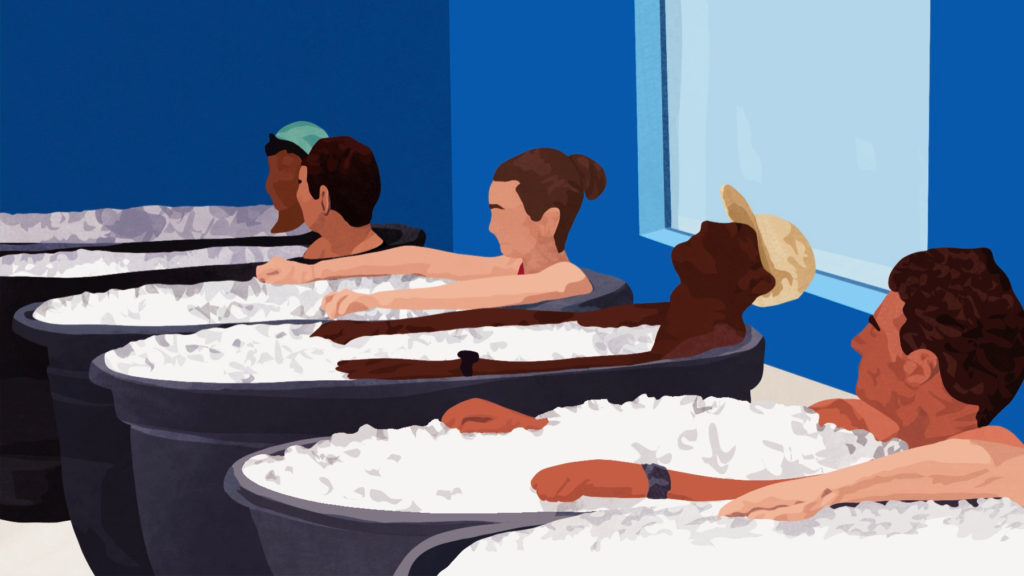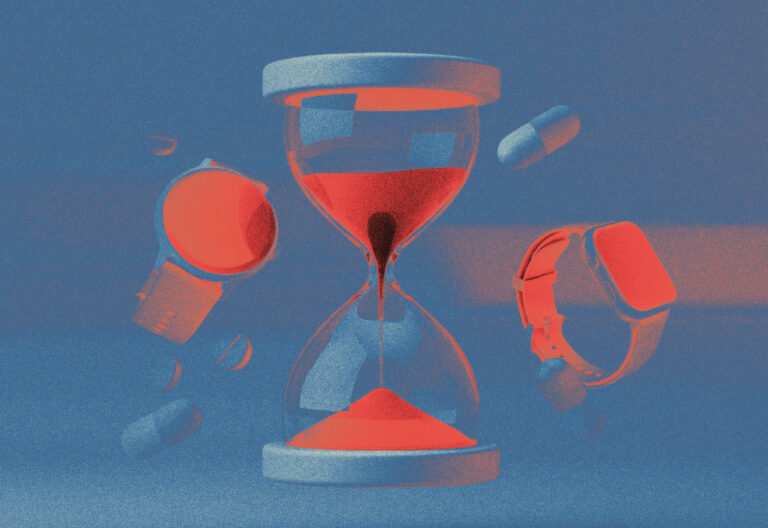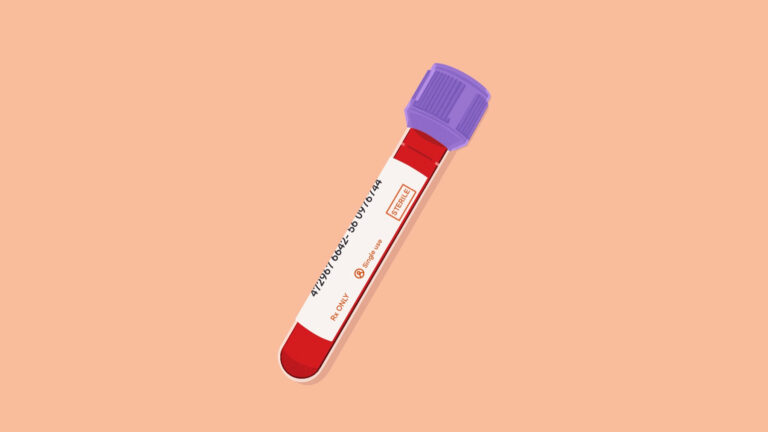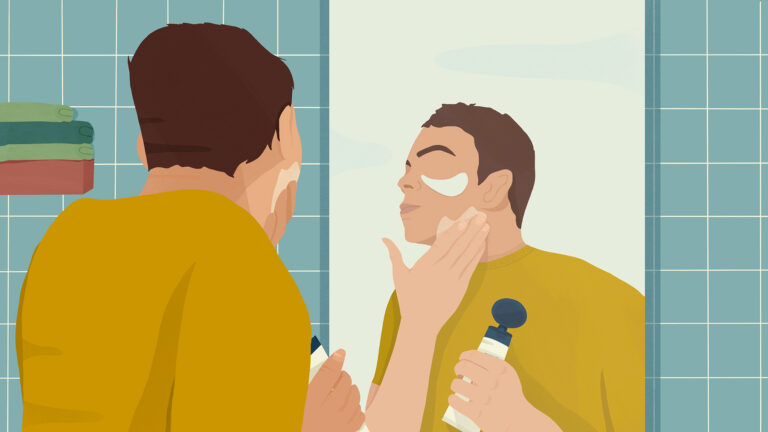As the pendulum swings from digital community to real-life connection, social wellness experiences are in high demand.
Holistic Hangs
Los Angeles-based Remedy Place, a wellness social club, raised $5M in funding ahead of expanding to New York City.
Social self-care. Promoting holistic healing, the club offers a host of “remedies,” from breathwork, ice bath, and sauna sessions to vitamin IVs, hyperbaric chambers, and functional medicine consults.
Bringing people together, there are group classes, as well as a bar and lounges serving non-alcoholic beverages. As founder and CEO Dr. Jonathan Leary told WWD:
“We needed to create a club that is temptation- and toxin-free, but also enhances people’s health and social life at the same time.”
Well-thy. The West Hollywood location is capped at 200 members, who pay $500/mo., or $2,500/mo. for unlimited services.
Expanding to NYC’s Flatiron District, the new 7,200-square-foot club will accept 300 members at $600/mo. or $2,750/mo., respectively. However, both locations welcome non-members at full, per-booking rates.
The bigger picture: Catering to high-end clientele, Remedy Place isn’t for everyone. But, after two years of pandemic-induced isolation, spa-like self-care and community-based wellness are trending up.
Come Together
Alone in our homes—but together on Peloton’s leaderboard or in Discord channels—virtual communities were the talk of 2020.
Decades in the making, we explored the broader culture shift in Issue No. 103, quoting author Bill Bishop on the evolution of community:
“It used to be that people were born as part of a community, and had to find their place as individuals. Now people are born as individuals, and have to find their community.”
Blessed. A step further, as participation in organized religion declines alongside a growing distrust of societal institutions, community is increasingly something that we choose.
- 30% of millennials and Gen Z have no religious affiliation, per Gallup.
- Church membership among US adults recently fell below 50% for the first time.
Searching for meaning and hoping to combat rising levels of loneliness, younger generations increasingly worship at the church of wellness.
Be well. Meanwhile, the pandemic highlighted the importance of personal well-being.
- Mindbody: 78% of consumers say wellness is more important than ever.
- McKinsey: 79% of consumers believe wellness is important; 42% said it’s a top priority.
At the same time, what constitutes “wellness” is evolving.
According to Mindbody, workout motivations have changed from a pre-pandemic emphasis on weight loss to a newly established focus on stress reduction. Echoing this sentiment, Mindbody CEO Josh McCarter told Bloomberg:
“In addition to physical well-being, one’s emotional, mental, and spiritual fitness has become a bigger priority.”
Similarly, a Mintel survey found that mental/emotional well-being has overtaken physical fitness as the top reason for exercising.
Social Wellness
Now, as COVID precautions subside, individuals starved for human connection are venturing out in search of belonging and well-being.
The result, as we predicted in Issue No. 140, has been the resurgence of in-person, wellness-themed experiences:
“Prior to the pandemic, a number of wellness social clubs, recovery studios, and luxury bath houses gained traction. As the world reopens, health-focused third spaces like The WELL, Remedy Place, and BATHHOUSE could thrive.”
Accelerating this trend, as the recovery boom collides with the return of spas and the rise of mental fitness, new formats are gaining traction.
- Self-work. From active listening to ice baths, Othership, Coa, and Peoplehood are reimagining therapy.
- Primed. Studios like Restore Hyper Wellness, Pause, and Myodetox focus on injury prevention and peak performance.
- Glow up. Doubling down on self-care, Ever/Body, Chillhouse, and FaceGym are giving wellness a makeover.
The list goes on… Brooklyn’s 7,000-square-foot “social wellness oasis” Gaia NoMaya offers everything from yoga and sound baths to concerts. And, as rock climbing thrives, indoor gyms like Brooklyn Boulders have become social hubs.
Zooming out: Nothing new, community plays a pivotal role in fitness, from the YMCA to boutique studios, and digital workouts. Elsewhere, a low-/no-cost alternative, running groups, cycling clubs, and recreational sports bring people together around breaking a sweat.
Punchline: The commodification of community and the proliferation of wellness will propel a trillion-dollar industry to new heights.
💪 Freemium Fitness
As connected equipment gets a reality check, fitness apps are getting creative to keep users engaged.
On the Fitt Insider Podcast: FitOn co-founder and CEO Lindsay Cook discusses how her platform’s freemium model has led to high user growth and low churn.
We also cover: the company’s recent $40M funding round and expansion to workplace wellness through its Peerfit acquisition.
Listen to today’s episode here
👟 Running Smoothly
Strava acquired Recover Athletics, an injury prevention platform for endurance athletes.
Bolstering its subscription, Strava’s athlete social network wants to keep users active.
Prehab. Delivering personalized routines for injury prevention, Recover Athletics helps users strengthen their bodies, reduce soreness, and bounce back from training.
As endurance sports boom, injuries are bound to follow — nearly 80% of runners sustain an injury every year. Focusing on prevention and simplifying sports medicine, Recover Athletics CEO Nick Stewart told us:
“Our app is unique because it’s truly evidence-based and fully integrated into the athlete’s lifestyle.”
Prior acquaintances. No strangers, before the acquisition, Recover had integrated with Strava’s API, helping users assess injury risks and save prehab workouts. Of note, Recover tested and launched the app through its Strava club, landing its first paying customers thanks to the group.
Scaling up. Recently surpassing 100M users, Strava doubled in size over the last two years. Teaming with Recover, subscribers receive access to the app, a perk intended to keep them moving — and paying.
Share this headline
🎧 Audio Vitamins
Wading further into wellness, Amazon launched a new mindfulness podcast.
Tune in. The series, called Become, features three weekly episodes. Instructor-led, a rotating cast of four coaches guides listeners through breathwork, meditation, and relaxation exercises in under 15 minutes.
Meant to be immersive, the show is made with custom music and binaural mixing, delivering what creator and SALT co-founder Jamie Schefman calls an “audio vitamin.”
Listen up. Increasingly, brands are using short-form audio to extend their reach within health and wellness:
- Nike debuted Mind Sets, a movement series for the mind.
- Noom recently launched Noom Mood to reduce stress and anxiety.
- Apple Fitness+ includes guided walks, runs, and mindfulness sessions.
Zooming out: While Calm and Headspace helped mainstream meditation, the space has become saturated. Now, mindfulness is simply another category in a brand’s content library.
Punchline: As wellness eats mindfulness, consumers are inundated with options. But, getting them to stick around is another story — installs of mental health apps are down over 30% since January 2021.
Share this headline
🍏 Google Health
Bringing together hardware, talent, and health data, Google is pushing into healthcare.
Watch this. Making its smartwatch official, Google’s long-rumored Pixel Watch will debut this May. Built on Google’s Wear OS software, it’ll sport Fitbit’s health-tracking capabilities, though both ecosystems will remain siloed.
A-team. Google Health recently announced the hire of Bakul Patel, the FDA’s former digital health chief. Entering his new role, Patel wrote:
“The power of technology, when coupled with a unified digital health and regulatory approach, promises to transform people’s lives.”
Connect the dots. Boosting its health and fitness ecosystem, Google linked with Samsung on the Health Connect API, uniting data across apps, from Flo to MyFitnessPal to Fitbit.
Speed bumps. Last summer, Google Health boss David Feinberg left the company, prompting Google to dissolve the division. Complicating matters, Fitbit faces a lawsuit related to overheating and burn injuries that could prompt a recall.
Cashing in: Big Tech wants a piece of the trillion-dollar healthcare market.
- Apple is forging ahead, from primary care to glucose monitoring and Fitness+.
- Amazon is making inroads with telehealth, prescriptions, wearables, and more.
- As wearables become medical devices, WHOOP, Oura, and Withings are courting FDA approval.
Takeaway: A renewed effort, Google’s healthcare strategy is shaping up.
Share this headline
📰 News & Notes
- Oura teases a Gucci collab.
- Under Armour CEO Patrik Frisk steps down.
- Outside lays off 15% of staff, cuts print publications.
- Echelon partners with Full Sail on fitness technology lab.
- PUMA teams with Roblox for sports-based games and training.
- Fitt Jobs: 750+ career opportunities in the health & fitness world.
- Startup Q&A: Levels CEO Sam Corcos on tackling the metabolic health crisis.
- Cerebral CEO Kyle Robertson ousted amid DOJ investigation. [Re-read: Quality Control]
💰 Money Moves
- Strava acquired Recover Athletics, an injury prevention platform for endurance athletes.
More from Fitt Insider: Our conversation with Recover Athletics CEO Nick Stewart - LA-based membership wellness club Remedy Place raised $5M in a bridge funding round from recording artist ZEDD and others ahead of its NYC expansion.
- Micro-weighted apparel maker OMORPHO added $6M in extended seed round funding led by KB Partners.
More from Fitt Insider: Technical Threads - Nestlé acquired Puravida, a Brazilian foodtech startup manufacturing organic, plant-based foods.
More from Fitt Insider: Nestlé’s Wellness Buying Spree - MMA company PFL added $30M from investors including Alex Rodriguez, notching a $500M valuation.
- Pique, a digital sexual health clinic for women, launched after raising $4M in funding.
More from Fitt Insider: The Great Destigmatization - Women’s health startup Oviva Therapeutics emerged from stealth with $11.5M in seed funding to develop contraceptives that can extend women’s healthspan.
- moka.care, a French corporate mental health platform, landed €15M ($16M) in a Series A round led by Left Lane Capital.
- Israeli foodtech firm Imagindairy, makers of animal-free dairy products, added $15M in seed funding.
- Aumio, a Germany-based mental health and meditation app for children, secured €3M ($3.17M) in a seed round.
- Jukebox Health, an eldercare platform helping seniors age in place, launched out of stealth after raising undisclosed funding from Primary Venture Partners.
More from Fitt Insider: Retiring Well - Peer counseling platform Peer Collective secured an undisclosed investment from MMV.
- Foodtech company Hyfé Foods, makers of protein-rich mycelium flour, added $2M in an oversubscribed seed round.
More from Fitt Insider: The ’Shroom Boom - Pediatric behavioral startup Parallel Learning landed $20M to virtually assess mental health and learning challenges.
More from Fitt Insider: The Kids Aren’t Alright - Maternity healthcare startup Cayaba Care closed a $12M Series A to provide maternity and pediatric care to low-income families.
- Denmark-based Atlon, creator of workout tracking software for CrossFitters, secured 3.5M DKK ($504.9K) in pre-seed funding.
- Homethrive, a tech-enabled eldercare company, raised $20M in Series B funding led by Human Capital.
Today’s newsletter was brought to you by Anthony Vennare, Joe Vennare, Ryan Deer, and Melody Song.






